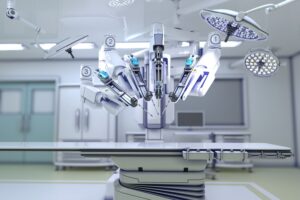Healthcare is undergoing a technological revolution that will radically change the delivery, diagnosis, and management of care. Smart solutions, powered by artificial intelligence (AI), can improve accuracy, reduce costs, and enhance patient outcomes across all care channels. AI is revolutionizing medicine through advanced diagnostic tools that detect diseases earlier and robotic surgical devices that deliver precision treatments. Drug discovery, administrative efficiency, and personalized treatments that were previously considered science fiction are all part of this transformation. AI-driven solutions are helping healthcare systems worldwide cope with growing patient numbers, rising costs, and the need for improved outcomes.
Smart Tech and AI Are Transforming Healthcare:
Artificial intelligence in healthcare is one of our greatest technological achievements. Smart technologies such as machine learning algorithms and deep neural networks help healthcare providers quickly and accurately interpret vast amounts of medical data. These systems can analyze patient demographics, medical images, genetic data, and treatment outcomes to reveal insights that would take years to uncover in humans. Within seconds, AI systems can compare millions of medical records and research articles to provide potential diseases and treatment options for difficult diagnoses. These technological advances empower healthcare professionals to make informed decisions and provide better care to patients.
AI in Imaging and Diagnosis:
Smart diagnostics has revolutionized the diagnosis and interpretation of diseases in medical imaging, making it one of the most successful applications of AI in healthcare. AI-driven imaging systems can accurately analyze X-rays, MRIs, CT scans, and ultrasounds to detect abnormalities that humans might miss. These technologies excel in early cancer detection, which can improve patient survival.
Radiology departments worldwide are using AI algorithms to prioritize urgent patients, reduce wait times, and perform initial assessments, freeing radiologists to focus on the most important results. AI can quickly and reliably scan hundreds of images, making large-scale health screenings more feasible and cost-effective. AI diagnostics are also being developed for remote, impoverished areas where medical expertise is scarce, making high-quality diagnostic services more accessible.
AI in Personalized Medicine:
AI enables doctors to tailor treatment plans for each patient based on their genetics, medical history, and lifestyle. AI algorithms can analyze vast amounts of genetic data, clinical trial data, and patient outcomes to determine which medications are likely to be most effective for a given individual. This approach differs from the “one-size-fits-all” model of medicine, where treatments are based on the average patient population.
Smart systems can predict how patients will respond to different medications, allowing doctors to prescribe the most effective drugs with the fewest side effects. AI can assess tumor genetics and patient characteristics to develop effective, cancer-targeted drugs, making this technology highly attractive. AI-driven personalized medicine is also applicable to preventive care, where algorithms can identify high-risk patients and prescribe lifestyle changes or screenings.
Using AI for Drug Development:
The pharmaceutical industry has leveraged AI to accelerate drug development. Drug development can take 10 to 15 years and cost billions of dollars, with many drugs failing in clinical trials. AI is faster than traditional methods at analyzing chemical structures, predicting drug interactions, and identifying potential molecules. Machine learning algorithms can filter through literally millions of compounds to find the most promising ones before expensive laboratory testing.
Using smart systems to repurpose existing drugs to treat new diseases can reduce development time and costs. Researchers are using artificial intelligence to predict drug toxicity and side effects and eliminate harmful molecules early in development. The technology also improves the design of clinical trials by identifying accurate patient demographics, predicting enrollment problems, and monitoring trials in real time to ensure they proceed as planned.
AI in Robotic Surgery:
AI is improving the precision and safety of robotic surgery, transforming previously challenging surgical procedures. AI surgical robots outperform humans in visualization, tremor control, and instrument guidance. These devices use real-time imaging and machine learning algorithms to manipulate surgical instruments with millimeter precision, reducing complications and improving patient outcomes.
Smart surgical robots can learn from thousands of previous procedures to enhance surgical performance and provide surgeons with data-driven insights. AI helps minimally invasive surgeons navigate complex anatomical areas through small incisions, minimizing patient trauma and shortening recovery time. AI-assisted surgical technologies are also being developed to perform common surgeries autonomously, enabling qualified surgeons to treat more challenging patients and potentially addressing the shortage of surgeons in underserved areas.
AI in Healthcare Management:
AI solutions optimize healthcare management by automating routine processes, reducing paperwork, and improving efficiency. Smart management technologies handle insurance claims, appointments, patient records, and billing without human intervention. AI chatbots and virtual assistants handle patient consultations, appointment scheduling, and basic triage, reducing administrative burdens and improving patient satisfaction.
These technologies can optimize resource allocation, predict patient flow, and identify bottlenecks before they impact patient care by analyzing hospital operations. AI improves revenue cycle management by detecting billing issues, improving coding, and reducing claim denials. Systems automatically monitor compliance with healthcare regulations to identify potential gaps before they become problems. Improved administrative efficiency allows hospitals to focus more on patient care, reduce operational costs, and improve system performance.
Conclusion:
AI is transforming healthcare, but this is only the beginning of a technological revolution that will continue to evolve. As AI systems evolve and the volume of healthcare data increases, we can expect more innovative applications to improve patient outcomes and healthcare services. Integrating AI into healthcare means reshaping the care model to make it more accurate, efficient, and accessible worldwide. These smart technologies enable healthcare institutions to better address future challenges and provide better patient care while operating more efficiently and cost-effectively. As artificial intelligence (AI) advances, healthcare will become more personalized, predictive, and powerful. As we move forward, human capabilities and AI will continue to expand healthcare and improve patient outcomes worldwide.
FAQs:
1. How accurate are AI diagnostic tools compared to doctors?
In several areas, AI diagnostic technology performs as well as or better than humans, such as in interpreting medical images. AI works best in tandem with human capabilities because doctors can provide important context and clinical judgments that AI cannot replicate.
2. Is AI in healthcare safe and private?
AI technology in healthcare is safe and must comply with privacy regulations. Access to patient data is restricted, encrypted, and anonymized. Healthcare companies must upgrade their security strategies to address new cyberthreats.
3. Will AI replace doctors and nurses?
AI will support doctors, not replace them. AI can perform routine tasks and provide diagnostic support, but human healthcare professionals are needed to participate in patient interactions, make complex decisions, and offer compassionate care. All of this requires emotional intelligence and empathy.
4. What does it cost to implement AI in healthcare?
The cost of implementing AI in healthcare varies by application and scale. Despite the high initial investment, AI technology can reduce costs by increasing efficiency, reducing errors, and improving patient outcomes. Many healthcare institutions are running pilot programs before scaling up.
5. What are the biggest challenges for AI applications in healthcare?
Ensuring data quality and interoperability, complying with regulatory standards, controlling implementation costs, training staff in the use of AI technology, and maintaining patient trust are key considerations. Healthcare institutions must also validate AI technology to ensure it operates safely and efficiently in clinical settings.




